Impact of State Barrier Fence to be enhanced by Esperance extension
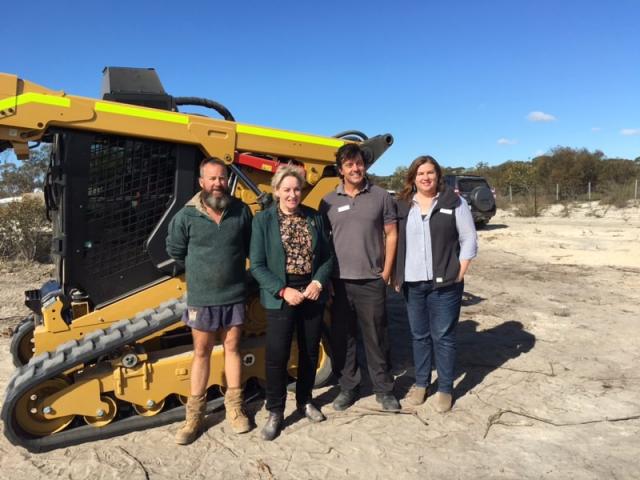
The historic State Barrier Fence (SBF) plays an important role in minimising the impact of invasive species and protecting Western Australia’s agricultural areas.
Originally built starting between 1902 and 1907 to prevent rabbits migrating from the east, today the fence plays a vital role in preventing the entry of wild dogs and emus from the rangelands into farming areas in the agricultural region of Western Australia.
For many years, the fence has extended from the Zuytdorp cliffs north of Kalbarri, through to Jerdacuttup, east of Ravensthorpe, in the south.
This left the south east agricultural areas of Ravensthorpe and Esperance exposed to the incursion of wild dogs from pastoral areas.
Farmers and communities in the Esperance and Ravensthorpe areas, where wild dogs have increasingly had a socio-economic impact by affecting livestock and limiting livestock enterprises, have long waited for extension of the State Barrier Fence.
Esperance extension
Earlier this month, Agriculture and Food Minister Alannah MacTiernan announced that construction on the highly anticipated Esperance extension of the fence had commenced, coordinated by the Department of Primary Industries and Regional Development.
When completed, the new stretch of State Barrier Fence will create a 660 kilometre boundary that protects farming properties in Western Australia’s south east from the impacts of wild dogs on livestock, emus on grain crops, and kangaroos from the rangelands and adjacent woodlands.
The State Government’s $6.9 million investment in the fence extension, with collaborative funding from the shires of Esperance and Ravensthorpe, and the Federal Government, is part of a broader range of measures to support Western Australia’s livestock industry to combat wild dogs.
Australian Wool Innovation has provided fencing machinery free of charge via a lease arrangement.
Completion of the project will see the whole fence stretch 1850km, from the Zuytdorp cliffs to Condingup, east of Esperance.
Impacts of wild dogs
Wild dog predation of livestock has taken a heavy economic and emotional toll on livestock producers in the Ravensthorpe and Esperance areas.
In addition to significant annual livestock losses to wild dogs, their threat is a major deterrent to restocking of livestock enterprises, and to associated regional development opportunities, such as transport and shearing services. Wild dogs also impact tourism and public safety, and cause stress to individuals and communities.
Stock losses from wild dogs in Western Australia’s rangelands alone are estimated at $25 million each year.
The economic impacts of the State Barrier Fence on wild dog predation on small livestock enterprises was documented in a 2015 report as having a positive ‘Benefit-Cost Analysis that expects a return of between $4.40 to $6.80 for every dollar spent.
Strategic approach to wild dogs management
The State Barrier Fence Esperance extension project is part of a strategic approach to support industry and landholders to manage wild dogs in agricultural and pastoral areas of the State, via the industry-led WA Wild Dog Action Plan 2016-2021.
The department is coordinating construction of the 1.35 metre-high Esperance extension and its 20m-wide reserve, following environmental approval by the Environmental Protection Authority in April.
Opportunities for local businesses
In line with WA Government’s local content initiative, the project is maximising local supplier, contractor and job opportunities in the regions by supporting employment and training opportunities for local businesses and Aboriginal people.
The Esperance Tjaltjraak Aboriginal Rangers have been engaged in building the first 8.5km of the Esperance extension as part of fence construction training, with the aim of better equipping the group to seek future fence contracting opportunities, leading to job and economic growth.
The State Government will continue discussions with two Native Title groups, regarding sections of the fence that are subject to Native Title.
Wild dog control
Landowners and occupiers are reminded that under the Biosecurity and Agriculture Management Act 2007, landholders are responsible for wild dog control on their land, using the most humane methods available.
Wild dog control options include ground and aerial baiting with meat poisoned with 1080, canid pest ejectors, trapping using strychnine, fencing, and trapping and shooting.
Wealth of information available to navigate Season 2019
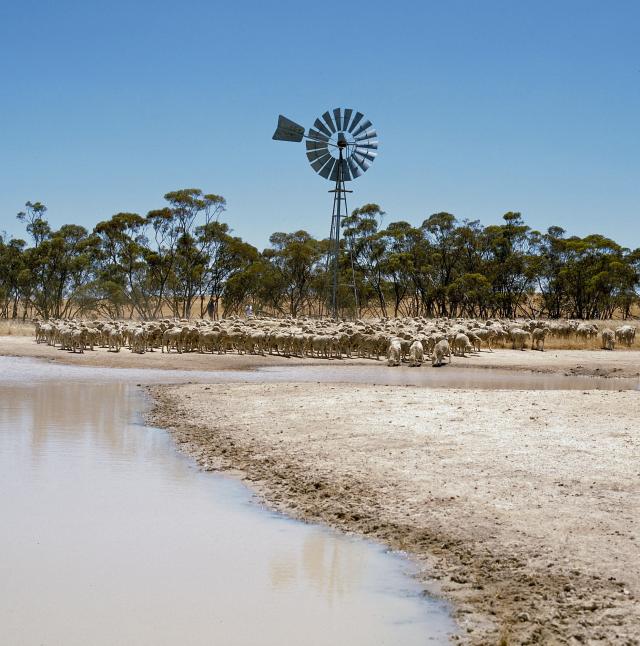
Below-average rainfall across the majority of the grainbelt is creating challenges for grains and livestock producers, particularly on the South Coast and in adjacent Lakes and Great Southern districts.
The Department of Primary Industries and Regional Development (DPIRD) has been monitoring the situation for several months and liaising with grower groups and shires to provide relevant, timely advice and support.
The department’s Season 2019 webpage harnesses a wealth of information to assist landholders to help navigate the season, which is reviewed and updated regularly.
Season forecast and cropping
The department’s Statistical Seasonal Forecast (SSF) and the Bureau of Meteorology’s outlooks for the next three months have overall predictions for a drier than normal season, with some variables for different regions.
The SSF indicates the chances of exceeding median rainfall between May and July is less than average (40%) in the northern and southern grainbelt, more favourable (60%) in the far eastern areas and the shires of Ravensthorpe and Esperance, and neutral (40-60%) elsewhere.
The SSF’s longer term outlook for May to October is similar, suggesting the 2019 growing season is likely to be similar to last year’s for many districts.
The department’s plant available soil water maps show stored soil moisture levels are extremely low across much of the grainbelt, except for parts of the south coast.
Growers across the grainbelt are modifying their programs in response to these conditions and reviewing fertiliser strategies in line with weather forecasts.
The department has a range of climate and weather tools and live weather data to assist landholders’ crop management tactics, in addition to the resources on its Season 2019 webpage.
The website includes links to land management resources to assist landholders implement strategies to minimise the risk of soil erosion.
Water management
On-farm water supplies in some south-eastern districts have become tight, and landholders have been carting water for livestock.
In May, the State Government announced Water Deficiency Declarations for Mount Short in the Shire of Ravensthorpe, and the Mallee Hill area in the Shire of Lake Grace.
The declaration enables the Department of Water and Environmental Regulation (DWER) to cart water to strategic locations to reduce the distance local farmers have to travel to source emergency water for their livestock.
The Water Corporation has reminded farm businesses that standpipes are primarily available for stock water to prevent animal welfare issues but local governments do have several high-flow standpipes available to access larger volumes of spray water.
The Commonwealth’s On-Farm Emergency Water Infrastructure Rebate Scheme has been extended to eligible commercial livestock farmers and pastoralists in Western Australia.
The Commonwealth and State governments are working together to deliver $4.6 million for on-farm water infrastructure for livestock – such as tanks and troughs, pipes, fittings and pumps associated with water distribution systems, new bores, and the desilting of dams by a contractor.
The rebate is for 25% up to a maximum of $25,000 for the purchase, delivery and installation of new water infrastructure to address animal welfare needs and improve resilience to drought.
DPIRD reminds landholders with low water supplies to ensure the quality of the water used for spraying does not compromise crop performance.
The Season 2019 webpage has a link to an article on Water Quality for Spraying that details factors affecting chemical performance and possible remedies.
Livestock management
Feed budgeting has become imperative for livestock producers to optimise pastures, limited by the seasonal conditions.
Producers are encouraged to regularly review the Pastures from Space maps of feed on offer and pasture growth rates, available for free from the department’s Season 2019 webpage.
The maps are a valuable tool to help producers manage and plan their stock’s supplementary feeding regime, which could be protracted if dry conditions persist.
Sheep producers have also been urged to review their flock marketing and management strategies, in light of the Commonwealth’s confirmation of a pause in live exports to the Middle East from June to August, inclusive.
The department’s Live Export Sheep webpage lists a number of options, considerations and feed requirements to assist producers and consultants to make informed decisions.
The Season 2019 webpage also has links to assist decision making, including a Feed Cost Calculator and supplementary feeding articles.
R U OK?
The Season 2019 webpage includes links to social support services, including the Rural Financial Counselling Service WA, Beyond Blue Support Service and the Virtual Psychologist.
Department staff at offices located throughout the State are also available to talk to about livestock, cropping and land management strategies throughout the season.
State budget to support DPIRD's efforts to elevate primary industries and regions
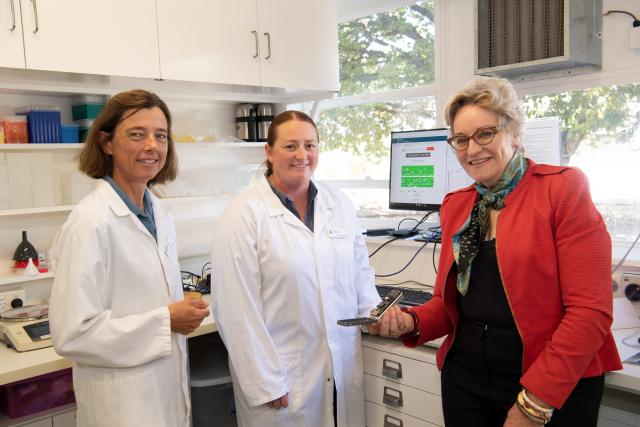
From Minister for Regional Development; and Agriculture and Food, Alannah MacTiernan
The State budget has put the Department of Primary Industries and Regional Development (DPIRD) on a solid footing to rebuild its vital role in protecting, managing and growing our primary industries and the economic development of our regions.
DPIRD has a total of $483.2 million to spend for 2019-20, which is a $15.2 million increase on the estimated expenditure figure for 2018-19.
This includes a portion of hard-fought additional funding of $131.5 million, spread over the next four years, for core activities and infrastructure and systems upgrades.
The budget enhancement recognises the valuable contribution Western Australia’s primary industries and regions make in driving the State economy, growth and jobs.
This investment ensures the department fulfils its critical role in supporting the State’s diverse agriculture and fisheries sectors, while providing a long term, sustainable funding base for core functions.
It supports endeavours to rebuild the department’s capacity and stabilises staff numbers at about 1580 full-time equivalents, based in facilities throughout the length and breadth of the State.
Biosecurity
The 2019-20 budget will see increased funding allocated to biosecurity activities to ensure WA’s primary industries are protected from pests and diseases and our enviable production reputation is maintained.
These funds will enable the department to work closely with industry, other government authorities and the community to maintain vigilance through a number of biosecurity programs across the State.
The department will also be equipped to work alongside industry to respond to incursions of plant and animal biosecurity threats to minimise the impact on production and access to export markets.
The commitment also includes supporting the department’s important work in animal welfare regulation, as it fulfils its responsibilities in administering the Animal Welfare Act 2002.
Laboratory upgrades
Some of the additional funding has been earmarked for a $3.3 million upgrade of some laboratory areas at the department’s South Perth facility.
Priority will be given to building laboratory containment facilities for high-risk microbiological agents, a molecular diagnostics facility and a new area for integrating the department’s Pest and Disease Identification Service and the DPIRD Diagnostics and Laboratory Services
Specimen reception.
This investment will ensure the department has the latest science and technology to undertake efficient and effective pest and disease identification, imperative to ensure a timely response.
Research and development
The State Budget includes an allocation to continue to advance the department’s research, development and innovation agenda, across the State’s diverse primary industries.
Long term, independent research and innovation, backed by highly skilled researchers, resources and infrastructure is essential for WA to remain internationally competitive.
This includes a $25 million injection into a suite of six new grains projects to increase productivity, yields and profitability, including three soils projects and three crop agronomy projects in partnership with the Grains Research and Development Corporation.
This will be part of the Boosting Grains Research and Development initiative to address a wide range of production issues specific to WA that is helping fine tune our dryland cropping and mixed farming systems.
There is also a commitment for the department to play a greater role in creating reinvigorated and collaborative research, development and innovation environment in WA for the agrifood sector to grow and thrive.
This will include more effective partnerships with universities and grower groups.
Agrifood development
The 2019-20 department budget includes a $39.6 million allocation of Royalties for Regions funds to continue several projects to help capture a share of growing global demand for food.
This includes the Boosting Grains Research and Development initiative, as well as the Asian Market Success project, which has a range of initiatives to enable WA agrifood businesses to extract greater value from premium markets through a customer-centric approach.
The Boosting Biosecurity Defences project is another endeavour designed to increase the State’s capacity to detect and respond to pest and disease incursions, which may threaten export markets.
Looking forward
This well-balanced budget acknowledges the importance of strong, innovative primary industries and thriving regions to WA.
It will ensure the department is equipped to assist the agriculture and food sector to continue to grow, diversify and capture opportunities in an increasing competitive global marketplace.
Agriculture has a great future if we all work together to support our industry.
Free workshops for WA food and Beverage producers
The Department of Primary Industries and Regional Development is offering a variety of free workshops to Western Australian food and beverage producers as part of the Food Industry Innovation (FII) project.
Project Manager of the Capacity Building Program Nikki Poulish said the upcoming workshops respond to requests for assistance in this area by businesses wanting to access further training and improve their skills.
“Branding, labelling and marketing has been the number one requested topic according to our surveys,” she said.
The FII project aims to develop the full potential of WA food and beverage businesses that are adding value to raw produce, growing jobs and building the state’s economy.
Register now to secure your free spot!
Marketing food and beverages in a changing world
Details: Merredin - 25 June 2019 and Burekup – 26 June 2019
This workshop will outline inspirational ways agricultural producers and processors can realise marketing opportunities, taking into consideration the changing consumer and retail demands. The workshop is presented by John Stanley, a global consultant on agri-tourism with more than 40 years’ experience.
Key topics include:
- What is changing and what does the world want?
- Understanding the consumer and your supply chain
- What makes your product and/or service unique
- Developing a marketing toolkit that works for you.
Save the dates for these upcoming workshops!
IP protection
Date: 14 June 2019
Location: Perth (with regional broadcast to DPIRD offices on demand)
This workshop is organised in partnership with Food Innovation Australia Limited
Food labelling workshop
Date: 5 July 2019
Location: Perth
This is a half-day workshop with food legislation specialist Chris Preston.
International brand building
Date: 17 July
Location: Perth (with regional broadcast to DPIRD offices on demand)
This workshop is organised in partnership with Food Innovation Australia Limited.
Vouchers available for expert assistance
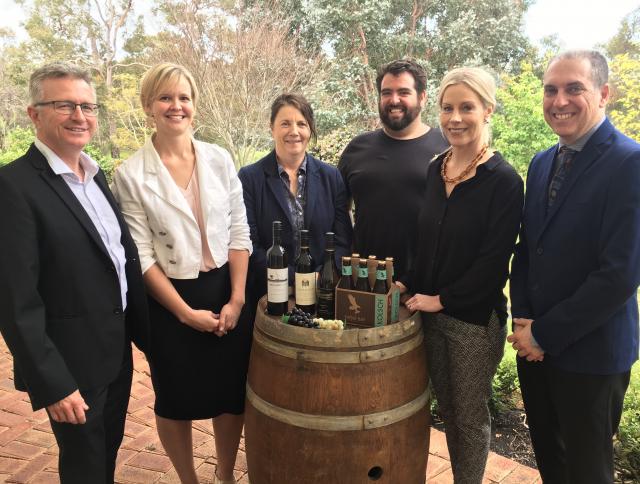
The DPIRD Expert for a Day is a business support initiative providing the state’s eligible premium food and beverage businesses with vouchers to engage professionals to work with them on enterprise growth initiatives identified in their business plans.
Eligible businesses will have access to a range of industry experts whose skill sets will assist to address identified gaps including:
- branding, labelling and marketing advice
- e-commerce expertise; in-market intelligence
- logistics
- sales capacity
- pricing strategies
- market and competitor analysis
- food technology
- access to specialist knowledge in exporting premium food and beverages.
The intiative now has 26 successful applicants including Kommunity Brew, Jarrah Honey Promotions Committee, Great Southern Truffles, Lenton Brae Winery, Pardoo Beef Corporation, Rok Kombucha, Illegal Tender Rum Co and Sumico (WA) Pty Ltd.
More information on the initiative and feedback from successful applicants is available on the department’s website.
Get on board and take advantage of professional expertise to boost your business.
Registrations are open for participation in 2019.
Research technology on show at TECHSPO
The Department of Primary Industries and Regional Development (DPIRD) is partnering with grower group Southern Dirt to host day two of this year’s TECHSPO at the Katanning Research facility on 8 August.
TECHSPO brings technology developers, farmers, advisors, expert researchers and officials together for two days of advanced agriculture technology, information sharing and collaboration with an optional study tour for those who want to experience more.
Topics covered will include virtual sale yards, augmented reality in farming, agricultural robotics and provenance and traceability trends.
Increased investment and rapid advancements in agricultural technologies have not only improved affordability, but also allowed for the industry to mature in recent years and demonstrate real returns on investment to farmers.
The first day of TECHSPOwill be held at the Wagin Showgrounds on 7 August.
Experts in agricultural innovation from Australia and abroad will share their knowledge and provide inspirational forums that address technological advancements in agriculture, while exhibitors will showcase innovative products and services set to revolutionise the face of Australian farming in the future.
Day two at the DPIRD facility will feature demonstration areas that allow participants to learn by doing with farmers able to touch and see the technologies first hand.
The day will commence with workshops which explore ways to integrate technology into farming enterprises and then move into field demonstrations which showcase the viability of these technologies on a property.
This will be made possible by DPIRD’s investment into cost-effective connectivity solutions at the facility which will also be on display.
The event will demonstrate areas that are critical for farming in this state including livestock technologies for sheep, cattle, and other animals, broadacre cropping technologies, big data and new apps, machinery and precision cropping with targeted inputs.
Early bird tickets are now available at a discount of $55 off the regular ticket price for a limited time.
To view the current program of activities, purchase your early bird tickets or take a sneak-peek at the line-up, visit the TECHSPO website.
Milling oats research project commences
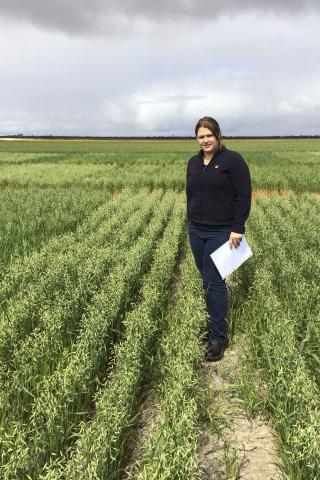
Genetic material is being sourced from around the world for a new project to develop new and improved milling oat varieties that will pave the way for increased production in Western Australia.
The Department of Primary Industries and Regional Development (DPIRD) research, with co-investment from the Grains Research and Development Corporation (GRDC), will lay the foundations for the adoption of high performance varieties suited to WA conditions.
Department research officer Georgie Troup said new milling oat varieties with high yields, good grain size and milling quality would add value to growers’ cropping programs.
Oats have a unique fit in the WA farming system, with the option to sow early, diversify crop rotations, and manage frost risk better than other cereals.
The two-year project will involve pre-breeding research and will evaluate a range of international milling oat germplasm (plant material), which could be adapted to WA conditions.
The research team has selected varieties that have a broader range of maturities than are currently grown in WA to support a shift towards earlier sowing.
The research team will evaluate the potential of the germplasm through planting a small amount of seed from a large number of varieties in replicated trials under controlled conditions using irrigation to aid establishment.
This will allow the team to assess the plants’ response to variations in temperature, photoperiod (the amount of light plants receive) and vernalisation (cold temperatures accelerating flowering).
The project will also evaluate breeding lines soon to be released by the National Oat Breeding Program and recently released varieties that could be suited to early sowing under various nutrition scenarios, to determine the best agronomic approach to improve grain quality and yield.
Ms Troup said the research was designed to assist WA growers to meet new Oat2 specifications, by combining the most suitable varieties with best-bet agronomy to achieve good yields that meet market milling quality requirements.
The 2019-20 harvest will see the introduction of tightened grain receival specifications for Oat2 milling oats, including a maximum screenings allowance of 15% through a two millimetre sieve and a maximum of 72 oat groats per standard measure.
The current, high yielding Oat1 varieties have either a risk of grain staining or a narrower grain shape, which can make it challenging for them to meet Oat2 receival standards.
This project seeks to address these issues by examining the potential for sowing winter and late spring milling oat varieties earlier, in April, to avoid the risk of small grain size, and high screenings.
Small plot trials have been established at Walebing, Nunile and Highbury to help develop agronomic systems to assist growers to satisfy the new Oat2 classification requirements.
Call for nominations for WA Regional Achievement and Community Awards
Nominations are now open for the annual Western Australian Regional Achievement and Community Awards to recognise the accomplishments of individuals, groups and businesses throughout the State.
The Department of Primary Industries and Regional Development (DPIRD) is a major partner in the awards, which features 12 categories ranging from agricultural innovation to business achievement to teaching excellence and volunteering.
The department is sponsoring the DPIRD Economic Development Award, which seeks to acknowledge the endeavours of those in the business and not-for-profit sectors to pursue opportunities that generate growth and jobs.
The award is open to retailers, service providers, organisations, development associations and groups that seek to improve prosperity in the regions by driving economic development, local capability and social amenity.
In addition to accolades, winners will receive $2,000 in prize money, a trophy and a certificate.
Department Director General, Ralph Addis, encouraged interested parties to nominate either themselves or a worthy recipient who was making a contribution to the regions.
“Regional WA punches above its weight in stimulating innovation, realising business opportunities and community engagement, often overcoming challenging conditions created by the tyranny of distance of our large State,” Mr Addis said.
“The department is proud to support these awards and applaud the achievements of regional Western Australians, who make a valued contribution to the economy and the wellbeing of so many people across the State.”
Previous recipients, such as 2018 DPIRD Economic Development Award recipients, health drink manufacturer Bee Firm, have highlighted the contribution of the regions to WA.
“I encourage anyone who has made a contribution to regional WA to nominate for these awards to support and encourage their endeavours and inspire others,” Mr Addis said.
To nominate for the DPIRD Economic Development Award or any of the other WA Regional Achievement and Community Awards visit the Awards Australia website. Nominations close Wednesday, 10 July
